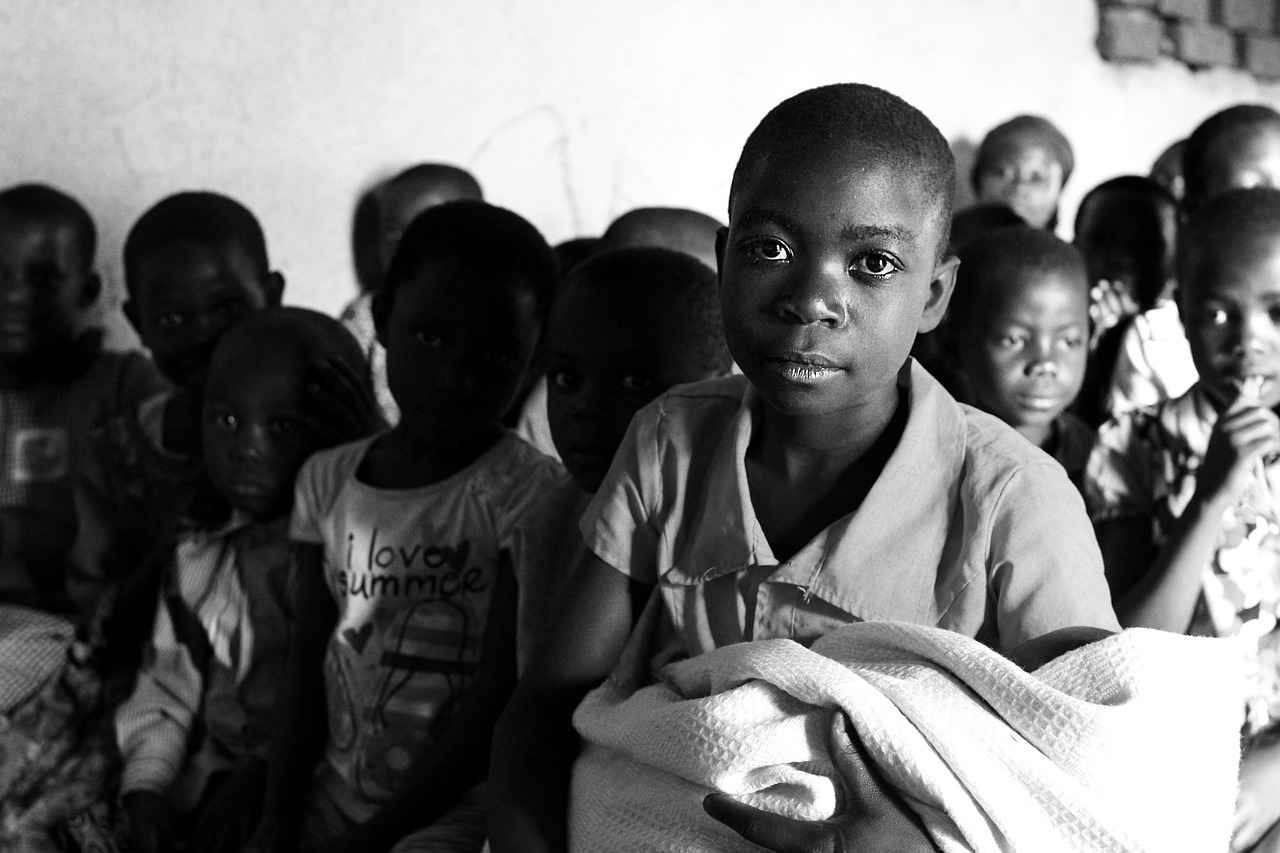This article delves into the significant role that films play in helping children understand and express their emotions. By engaging in captivating storytelling and connecting with relatable characters, children can develop their emotional intelligence.
The Importance of Emotional Intelligence in Childhood
Emotional intelligence is an essential aspect of childhood development, enabling children to navigate social situations and form healthy relationships. By recognizing and understanding their emotions, children can enhance their communication skills and learn effective coping strategies.
How Movies Can Teach Emotions
Films serve as a dynamic platform for children to observe a variety of emotions in action. Through visual storytelling, children can identify and label feelings that they may encounter in their own lives, fostering a deeper understanding of their emotional landscape.
Relatable Characters and Their Emotional Journeys
Characters in films often face challenges that resonate with children, showcasing their emotional responses. By following these journeys, children learn that experiencing a range of emotions is a normal part of life.
Examples of Iconic Films for Emotional Learning
- Inside Out: This film illustrates the complexities of emotions through the journey of a young girl and her emotions.
- WALL-E: A heartwarming tale that explores themes of love and loneliness in a futuristic world.
Creating Discussions Around Characters’ Emotions
Parents and educators can facilitate meaningful discussions about the emotions displayed by characters, encouraging children to express their own feelings and connect with the experiences portrayed in films.
Identifying Emotions Through Storytelling
Storytelling in films provides a safe space for children to explore their feelings and understand emotional complexities, allowing them to recognize and name their emotions.
Activities to Enhance Emotional Learning Through Film
Incorporating engaging activities based on films can reinforce emotional lessons, helping children process and articulate their feelings in a fun and interactive manner.
Emotion Journals Inspired by Movies
Encouraging children to maintain emotion journals after watching films can aid in reflecting on their feelings and articulating their thoughts, promoting emotional literacy.
Group Discussions and Role-Playing
Facilitating group discussions and role-playing scenarios based on movie themes allows children to practice empathy and emotional expression in a supportive environment.
Choosing the Right Films for Emotional Development
Selecting age-appropriate films that address a range of emotions is crucial for fostering emotional growth, ensuring children can relate to the content.
Recommended Films for Different Age Groups
Different age groups resonate with various themes; selecting films that align with children’s developmental stages can enhance their understanding of emotions.
Critically Acclaimed Films That Address Feelings
- The Lion King: A powerful exploration of love, loss, and resilience.
- Frozen: A tale that emphasizes the importance of family and self-acceptance.
Conclusion: The Lasting Impact of Films on Emotional Growth
Movies act as influential tools for emotional education, equipping children with the skills to understand and express their feelings. This ultimately leads to healthier emotional development, allowing them to thrive in their social environments.

The Importance of Emotional Intelligence in Childhood
Emotional intelligence plays a pivotal role in the overall development of children. It encompasses the ability to recognize, understand, and manage one’s own emotions, as well as the capacity to empathize with others. This skill set is essential as it helps children navigate the complexities of social interactions and fosters the development of healthy relationships.
When children are equipped with emotional intelligence, they can better articulate their feelings, leading to improved communication skills. They learn to express their emotions appropriately, which is crucial in preventing misunderstandings and conflicts. Moreover, understanding emotions allows children to develop effective coping strategies when faced with challenges, enhancing their resilience.
Research indicates that children with high emotional intelligence are more likely to succeed academically and socially. They tend to have better relationships with peers and adults, as they can understand different perspectives and respond with empathy. This emotional awareness fosters a supportive environment where children feel safe to express themselves.
Furthermore, emotional intelligence contributes to mental well-being. Children who can process their emotions are less likely to experience anxiety and depression. They develop a strong sense of self-awareness, which is fundamental for personal growth and emotional health.
In summary, fostering emotional intelligence in children is not just beneficial; it is essential for their holistic development. By nurturing these skills, we prepare them for a future where they can thrive in both personal and professional relationships.
- Benefits of Emotional Intelligence:
- Improved communication skills
- Better relationships
- Enhanced coping strategies
- Increased resilience
- Ways to Foster Emotional Intelligence:
- Encourage open discussions about feelings
- Model emotional awareness
- Provide opportunities for social interactions
By prioritizing emotional intelligence in childhood, we lay the groundwork for a generation of empathetic and emotionally adept individuals.

How Movies Can Teach Emotions
Films are a powerful medium that can significantly aid children in understanding and expressing their emotions. Through the engaging narratives and vibrant characters, children are presented with a unique opportunity to observe a wide range of feelings in a context that is both relatable and entertaining. This exposure is crucial for their emotional development.
When children watch movies, they are often captivated by the characters’ emotional journeys. These characters face challenges that resonate with the experiences of young viewers. For instance, a character dealing with loss or friendship issues can help children understand their own feelings in similar situations. By seeing how these characters react, children can learn to identify and label their emotions, which is a vital skill for emotional intelligence.
- Relatable Characters: Characters in films often mirror the challenges that children face in real life, allowing them to see that they are not alone in their feelings.
- Emotional Complexity: Movies often portray a spectrum of emotions, helping children grasp that feelings can be nuanced and multifaceted.
- Safe Exploration: Films provide a safe space for children to explore emotions without the pressure of real-life consequences.
Furthermore, films can serve as a springboard for discussions about feelings. Parents and educators can use movie scenes to ask open-ended questions about how a character might be feeling and why. This encourages children to articulate their own emotions and fosters a deeper understanding of emotional dynamics.
In conclusion, movies not only entertain but also serve as vital educational tools in helping children navigate their emotional landscapes. By observing characters and their experiences, children can learn to express their own feelings more effectively, laying the groundwork for a healthier emotional future.
Relatable Characters and Their Emotional Journeys
In the world of cinema, characters often encounter challenges that mirror the experiences of their young audiences. These relatable journeys allow children to witness a spectrum of emotions, helping them understand that feeling sad, happy, or even confused is a natural part of life. Through engaging storytelling, films provide a unique opportunity for kids to explore their own emotional landscapes.
When children watch characters face adversity, they begin to recognize their own feelings in similar situations. For instance, in the film Inside Out, viewers are introduced to the emotions of a young girl named Riley. As she navigates the complexities of moving to a new city, children can see how Joy, Sadness, Fear, Anger, and Disgust interact and influence her actions. This dynamic portrayal of emotions helps kids understand that it’s okay to feel a mix of feelings, and that each emotion has its own importance.
Moreover, characters like WALL-E and Elsa from Frozen go through significant emotional transformations, showcasing resilience in the face of hardship. Such narratives empower children to embrace their feelings and foster empathy towards others. They learn that expressing emotions is not only normal but essential for personal growth and connection with others.
In essence, films serve as a mirror reflecting the emotional challenges that children face. By identifying with characters and their journeys, kids can develop a deeper understanding of their own emotions and learn valuable lessons about emotional expression and empathy.
Examples of Iconic Films for Emotional Learning
When it comes to teaching children about emotions, certain films stand out as exceptional tools. These movies not only entertain but also provide valuable lessons about feelings, making them perfect for emotional learning. Here are some iconic films that help kids understand and express their emotions:
- Inside Out: This animated masterpiece takes viewers on a journey through the mind of a young girl named Riley. The film personifies her emotions—Joy, Sadness, Anger, Fear, and Disgust—allowing children to see how these feelings influence her actions and reactions. It emphasizes the importance of embracing all emotions, especially sadness, as a natural part of life.
- WALL-E: This heartwarming story follows a lonely robot tasked with cleaning up an abandoned Earth. Through WALL-E’s experiences, children learn about love, friendship, and the impact of loneliness. The film subtly addresses environmental issues while highlighting the significance of connection and caring for one another.
- The Lion King: A classic tale of loss, responsibility, and the circle of life, this film teaches children about grief and the importance of facing one’s past. Simba’s journey encourages kids to understand their feelings of fear, loss, and ultimately, acceptance.
- Frozen: This modern fairy tale showcases the bond between two sisters, exploring themes of love, sacrifice, and self-acceptance. The song “Let It Go” resonates with children as it encourages them to embrace their true selves and understand that it’s okay to feel different emotions.
- Up: This film beautifully illustrates the journey of grief and adventure. The character Carl Fredricksen learns to cope with loss while embracing new beginnings. Children can relate to the bittersweet emotions experienced throughout the story.
These films not only entertain but also serve as powerful tools for emotional education. By watching and discussing these movies, children can better understand their own feelings and learn how to express them in a healthy way.
Inside Out
Movie About Feelings for Kids: Learning to Express Emotions Through Film
This article explores how films can help children understand and express their emotions, fostering emotional intelligence through engaging storytelling and relatable characters.
The Importance of Emotional Intelligence in Childhood
Emotional intelligence is crucial for children’s development, helping them navigate social interactions and build healthy relationships. Understanding emotions leads to better communication and coping skills.
How Movies Can Teach Emotions
Films provide a rich medium for children to observe various emotions in action, allowing them to identify and label feelings they may experience in their own lives.
Relatable Characters and Their Emotional Journeys
Characters in movies often face relatable challenges, showcasing their emotional responses. Children can learn from these journeys, understanding that it’s normal to feel a range of emotions.
Examples of Iconic Films for Emotional Learning
- Inside Out
- WALL-E
These films illustrate emotional struggles and growth, making them excellent tools for teaching kids about feelings in an engaging way.
Creating Discussions Around Characters’ Emotions
Parents and educators can facilitate discussions about characters’ emotions, encouraging children to express their own feelings and relate to the experiences portrayed in films.
Identifying Emotions Through Storytelling
Storytelling in films helps children recognize and name emotions, providing a safe space to explore their feelings and understand emotional complexity.
Activities to Enhance Emotional Learning Through Film
Incorporating activities based on films can reinforce emotional lessons, helping children process and articulate their feelings in a fun and interactive way.
Emotion Journals Inspired by Movies
Encouraging children to keep emotion journals after watching films can help them reflect on their feelings and articulate their thoughts, promoting emotional literacy.
Group Discussions and Role-Playing
Facilitating group discussions and role-playing activities based on movie scenarios allows children to practice empathy and emotional expression in a supportive environment.
Choosing the Right Films for Emotional Development
Selecting age-appropriate films that address a variety of emotions is essential for fostering emotional growth in children, ensuring they can relate to the content.
Recommended Films for Different Age Groups
Different age groups resonate with various themes; selecting films that align with children’s developmental stages can enhance their understanding of emotions.
Critically Acclaimed Films That Address Feelings
- The Lion King
- Frozen
These films have been praised for their emotional depth, making them ideal for teaching children about love, loss, and resilience.
Conclusion: The Lasting Impact of Films on Emotional Growth
Movies serve as powerful tools for emotional education, equipping children with the skills to understand and express their feelings, ultimately leading to healthier emotional development.
and
Movie About Feelings for Kids: Learning to Express Emotions Through Film
This article explores how films can help children understand and express their emotions, fostering emotional intelligence through engaging storytelling and relatable characters.
The Importance of Emotional Intelligence in Childhood
Emotional intelligence is crucial for children’s development, helping them navigate social interactions and build healthy relationships. Understanding emotions leads to better communication and coping skills.
How Movies Can Teach Emotions
Films provide a rich medium for children to observe various emotions in action, allowing them to identify and label feelings they may experience in their own lives.
Relatable Characters and Their Emotional Journeys
Characters in movies often face relatable challenges, showcasing their emotional responses. Children can learn from these journeys, understanding that it’s normal to feel a range of emotions.
Examples of Iconic Films for Emotional Learning
- Inside Out
- WALL-E
These films illustrate emotional struggles and growth, making them excellent tools for teaching kids about feelings in an engaging way.
Creating Discussions Around Characters’ Emotions
Parents and educators can facilitate discussions about characters’ emotions, encouraging children to express their own feelings and relate to the experiences portrayed in films.
Identifying Emotions Through Storytelling
Storytelling in films helps children recognize and name emotions, providing a safe space to explore their feelings and understand emotional complexity.
Activities to Enhance Emotional Learning Through Film
Incorporating activities based on films can reinforce emotional lessons, helping children process and articulate their feelings in a fun and interactive way.
Emotion Journals Inspired by Movies
Encouraging children to keep emotion journals after watching films can help them reflect on their feelings and articulate their thoughts, promoting emotional literacy.
Group Discussions and Role-Playing
Facilitating group discussions and role-playing activities based on movie scenarios allows children to practice empathy and emotional expression in a supportive environment.
Choosing the Right Films for Emotional Development
Selecting age-appropriate films that address a variety of emotions is essential for fostering emotional growth in children, ensuring they can relate to the content.
Recommended Films for Different Age Groups
Different age groups resonate with various themes; selecting films that align with children’s developmental stages can enhance their understanding of emotions.
Critically Acclaimed Films That Address Feelings
- The Lion King
- Frozen
These films have been praised for their emotional depth, making them ideal for teaching children about love, loss, and resilience.
Conclusion: The Lasting Impact of Films on Emotional Growth
Movies serve as powerful tools for emotional education, equipping children with the skills to understand and express their feelings, ultimately leading to healthier emotional development.
WALL-E
Movie About Feelings for Kids: Learning to Express Emotions Through Film
This article explores how films can help children understand and express their emotions, fostering emotional intelligence through engaging storytelling and relatable characters.
The Importance of Emotional Intelligence in Childhood
Emotional intelligence is crucial for children’s development, helping them navigate social interactions and build healthy relationships. Understanding emotions leads to better communication and coping skills.
How Movies Can Teach Emotions
Films provide a rich medium for children to observe various emotions in action, allowing them to identify and label feelings they may experience in their own lives.
Relatable Characters and Their Emotional Journeys
Characters in movies often face relatable challenges, showcasing their emotional responses. Children can learn from these journeys, understanding that it’s normal to feel a range of emotions.
Examples of Iconic Films for Emotional Learning
- Inside Out
- WALL-E
These films illustrate emotional struggles and growth, making them excellent tools for teaching kids about feelings in an engaging way.
Creating Discussions Around Characters’ Emotions
Parents and educators can facilitate discussions about characters’ emotions, encouraging children to express their own feelings and relate to the experiences portrayed in films.
Identifying Emotions Through Storytelling
Storytelling in films helps children recognize and name emotions, providing a safe space to explore their feelings and understand emotional complexity.
Activities to Enhance Emotional Learning Through Film
Incorporating activities based on films can reinforce emotional lessons, helping children process and articulate their feelings in a fun and interactive way.
Emotion Journals Inspired by Movies
Encouraging children to keep emotion journals after watching films can help them reflect on their feelings and articulate their thoughts, promoting emotional literacy.
Group Discussions and Role-Playing
Facilitating group discussions and role-playing activities based on movie scenarios allows children to practice empathy and emotional expression in a supportive environment.
Choosing the Right Films for Emotional Development
Selecting age-appropriate films that address a variety of emotions is essential for fostering emotional growth in children, ensuring they can relate to the content.
Recommended Films for Different Age Groups
Different age groups resonate with various themes; selecting films that align with children’s developmental stages can enhance their understanding of emotions.
Critically Acclaimed Films That Address Feelings
- The Lion King
- Frozen
These films have been praised for their emotional depth, making them ideal for teaching children about love, loss, and resilience.
Conclusion: The Lasting Impact of Films on Emotional Growth
Movies serve as powerful tools for emotional education, equipping children with the skills to understand and express their feelings, ultimately leading to healthier emotional development.
illustrate emotional struggles and growth, making them excellent tools for teaching kids about feelings in an engaging way.
Movie About Feelings for Kids: Learning to Express Emotions Through Film
This article explores how films can help children understand and express their emotions, fostering emotional intelligence through engaging storytelling and relatable characters.
The Importance of Emotional Intelligence in Childhood
Emotional intelligence is crucial for children’s development, helping them navigate social interactions and build healthy relationships. Understanding emotions leads to better communication and coping skills.
How Movies Can Teach Emotions
Films provide a rich medium for children to observe various emotions in action, allowing them to identify and label feelings they may experience in their own lives.
Relatable Characters and Their Emotional Journeys
Characters in movies often face relatable challenges, showcasing their emotional responses. Children can learn from these journeys, understanding that it’s normal to feel a range of emotions.
Examples of Iconic Films for Emotional Learning
- Inside Out – This film illustrates emotional struggles and growth, making it an excellent tool for teaching kids about feelings in an engaging way.
- WALL-E – Another great example that showcases emotions and relationships.
Creating Discussions Around Characters’ Emotions
Parents and educators can facilitate discussions about characters’ emotions, encouraging children to express their own feelings and relate to the experiences portrayed in films.
Identifying Emotions Through Storytelling
Storytelling in films helps children recognize and name emotions, providing a safe space to explore their feelings and understand emotional complexity.
Activities to Enhance Emotional Learning Through Film
- Emotion Journals Inspired by Movies – Encouraging children to keep emotion journals after watching films can help them reflect on their feelings and articulate their thoughts, promoting emotional literacy.
- Group Discussions and Role-Playing – Facilitating group discussions and role-playing activities based on movie scenarios allows children to practice empathy and emotional expression in a supportive environment.
Choosing the Right Films for Emotional Development
Selecting age-appropriate films that address a variety of emotions is essential for fostering emotional growth in children, ensuring they can relate to the content.
Recommended Films for Different Age Groups
Different age groups resonate with various themes; selecting films that align with children’s developmental stages can enhance their understanding of emotions.
Critically Acclaimed Films That Address Feelings
- The Lion King – Praised for its emotional depth, making it ideal for teaching children about love, loss, and resilience.
- Frozen – A film that explores themes of love and family, resonating with young audiences.
Conclusion: The Lasting Impact of Films on Emotional Growth
Movies serve as powerful tools for emotional education, equipping children with the skills to understand and express their feelings, ultimately leading to healthier emotional development.
Creating Discussions Around Characters’ Emotions
Facilitating discussions about characters’ emotions in films is a valuable way for parents and educators to help children understand and articulate their own feelings. By engaging children in conversations about what they see on screen, adults can guide them to explore their emotional landscapes and foster a deeper emotional intelligence.
When children watch a film, they often connect with the characters and their experiences. This connection provides a unique opportunity to discuss emotions openly. For instance, after watching a movie, parents can ask questions like, “How do you think the character felt in that situation?” or “Have you ever felt something similar?” These questions encourage children to reflect on their own feelings and relate them to the characters’ experiences.
Moreover, discussing emotions portrayed in films can help children recognize that it is normal to experience a wide range of feelings, from joy and excitement to sadness and frustration. When children see characters navigating their emotional journeys, they learn that expressing feelings is not only acceptable but also an essential part of being human.
To make these discussions more effective, parents and educators can create a safe and supportive environment. This can be achieved by actively listening to children’s responses and validating their feelings. By doing so, children are more likely to feel comfortable sharing their thoughts and emotions.
Additionally, engaging in role-playing activities based on film scenarios can further enhance emotional understanding. Children can act out scenes and express how they believe the characters would feel, which allows them to practice empathy and emotional expression in a fun and interactive way.
In conclusion, creating discussions around characters’ emotions in films not only helps children articulate their feelings but also fosters a greater understanding of emotional complexity. By encouraging open dialogue, parents and educators can play a crucial role in nurturing children’s emotional intelligence.
Identifying Emotions Through Storytelling
Storytelling in films serves as a powerful tool for children to recognize and name their emotions. Through captivating narratives and engaging characters, children are provided with a safe space to explore their feelings and understand the complexity of emotional experiences. This process is essential for their emotional growth and development.
When children watch films, they are often exposed to a variety of emotional situations. These stories allow them to see characters experiencing joy, sadness, fear, and anger, which helps them relate these emotions to their own lives. For instance, a character overcoming a challenge can teach children about resilience, while a scene depicting loss can help them understand grief and compassion.
Moreover, films often present characters that children can identify with, making it easier for them to connect emotionally. As they watch these characters navigate their feelings, children learn that it’s normal to experience a wide range of emotions, and they begin to understand that emotions can be complex and multifaceted.
Parents and educators can enhance this learning experience by engaging children in discussions about the emotions portrayed in films. Asking questions such as, “How do you think the character feels?” or “What would you do in that situation?” encourages children to express their own feelings and relate to the characters’ experiences.
In conclusion, storytelling in films not only entertains but also plays a crucial role in helping children identify and articulate their emotions. By providing relatable scenarios and characters, films create an environment where children can safely explore their emotional landscapes, leading to improved emotional intelligence and well-being.
Activities to Enhance Emotional Learning Through Film
Incorporating activities based on films can significantly enhance children’s emotional learning. These activities not only reinforce the emotional lessons depicted in movies but also provide children with an interactive platform to process and articulate their feelings. By engaging with films, children can explore a wide range of emotions in a fun and relatable way.
Here are some effective activities that can be implemented:
- Emotion Journals: Encourage children to maintain emotion journals after watching a film. This practice allows them to reflect on their feelings, articulate their thoughts, and understand their emotional responses. They can write about what emotions the characters experienced and how those emotions relate to their own lives.
- Group Discussions: Organize group discussions where children can share their insights about the characters’ emotional journeys. This collaborative environment fosters empathy and encourages children to express their own feelings, helping them to connect with others.
- Role-Playing Activities: Create role-playing scenarios based on the movie’s plot. This not only makes the learning process enjoyable but also allows children to practice emotional expression and empathy by stepping into the shoes of different characters.
- Art Projects: After watching a film, have children create art projects that represent their feelings or a particular scene that resonated with them. This visual expression can help them articulate emotions that might be difficult to verbalize.
- Character Emotion Charts: Develop charts that outline the emotions of different characters throughout the film. Children can identify and label these emotions, which helps them learn to recognize and name feelings in themselves and others.
By integrating these activities into film discussions, parents and educators can create a rich learning environment that promotes emotional intelligence. This approach not only aids in emotional development but also helps children build stronger connections with their peers and the world around them.
Emotion Journals Inspired by Movies
Encouraging children to keep emotion journals after watching films can significantly enhance their ability to reflect on their feelings and articulate their thoughts. This practice not only promotes emotional literacy, but it also provides a structured way for children to process complex emotions they may encounter in their daily lives.
When children engage with films, they witness characters navigating a wide array of emotions, from joy and excitement to sadness and fear. By writing in their emotion journals, they can:
- Identify Feelings: Children can jot down specific emotions they felt during particular scenes, helping them connect their experiences with those of the characters.
- Articulate Thoughts: Writing allows them to express their feelings in words, a crucial step in developing communication skills and emotional understanding.
- Reflect on Experiences: Journals serve as a space for reflection, enabling children to think about how the film’s themes relate to their own lives.
To make the most of this activity, parents and educators can encourage children to answer questions such as:
- What was your favorite scene, and how did it make you feel?- Did any character's emotions remind you of your own experiences?- How would you have reacted in that situation?
By integrating these prompts into their journaling, children can delve deeper into their emotional landscapes. This practice not only nurtures their emotional intelligence but also fosters a habit of self-reflection that can benefit them throughout their lives.
In conclusion, maintaining an emotion journal after watching films is a powerful tool for children. It empowers them to explore their feelings, understand their emotional responses, and develop a vocabulary for expressing what they experience. As they grow, these skills will aid them in navigating the complexities of their emotional worlds.
Group Discussions and Role-Playing
Engaging children in group discussions and role-playing activities based on movie scenarios is an effective way to enhance their emotional intelligence. These activities provide a unique platform for children to explore their feelings and develop empathy in a safe and supportive environment.
Through group discussions, children can express their thoughts and emotions regarding various situations portrayed in films. This process not only helps them articulate their feelings but also encourages them to listen to their peers, fostering a sense of community and understanding. By sharing their perspectives, children learn that others may experience similar emotions, which can be comforting and validating.
Role-playing takes this a step further by allowing children to step into the shoes of different characters. This immersive experience helps them practice empathy as they navigate the emotional landscapes of the characters they portray. For instance, if a child acts out a scene where a character faces a challenge, they can better understand the character’s feelings and responses. This practice can lead to a deeper understanding of their own emotions and those of others.
| Benefits of Group Discussions | Benefits of Role-Playing |
|---|---|
| Encourages emotional expression | Enhances empathy through character immersion |
| Promotes active listening skills | Develops problem-solving abilities |
| Builds confidence in sharing feelings | Facilitates understanding of diverse perspectives |
Incorporating these activities into educational settings or home environments can significantly aid children’s emotional development. By discussing and acting out scenarios from their favorite movies, children can better understand complex emotions such as sadness, joy, and frustration. This hands-on approach not only makes learning about emotions fun but also equips children with the tools they need to navigate their feelings in real life.
In conclusion, facilitating group discussions and role-playing activities centered around movie scenarios is a powerful method for helping children practice empathy and emotional expression. By engaging with characters and stories, they can learn valuable lessons about their own emotions and the feelings of others.
Choosing the Right Films for Emotional Development
Selecting age-appropriate films that address a variety of emotions is essential for fostering emotional growth in children. By choosing films that resonate with their experiences, children can gain a better understanding of their own feelings. This process not only enhances their emotional intelligence but also aids in developing empathy and social skills.
Understanding Emotional Growth Through Film
Films provide a unique way for children to explore complex emotions such as joy, sadness, anger, and fear. These narratives allow children to see how characters navigate their emotional landscapes, which can help them relate to their own feelings. By viewing characters who face challenges, children learn that it’s normal to experience a wide range of emotions.
Age-Appropriate Content
- Young Children (Ages 3-7): Look for animated films that incorporate humor and adventure, such as Finding Nemo or My Neighbor Totoro, which gently introduce emotions.
- Middle Childhood (Ages 8-12): Films like Inside Out and Big Hero 6 delve deeper into emotional complexity and are relatable for this age group.
- Teens (Ages 13+): More mature themes can be explored in films like The Perks of Being a Wallflower or Dead Poets Society, which address identity and emotional struggles.
Encouraging Discussion
After watching a film, parents and educators can facilitate discussions about the emotions portrayed. Asking questions like, “How did the character feel when…?” or “What would you do in that situation?” encourages children to articulate their feelings and understand different perspectives.
Conclusion
In conclusion, the right films can serve as powerful tools for emotional development. By selecting movies that resonate with children’s experiences and emotions, caregivers can help foster a deeper understanding of feelings, ultimately promoting healthier emotional growth.

Recommended Films for Different Age Groups
Understanding emotions is a vital part of childhood development, and selecting the right films can significantly enhance this learning process. Different age groups resonate with various themes, and choosing films that align with children’s developmental stages can greatly improve their comprehension of feelings.
Films for Preschoolers (Ages 3-5)
- Finding Nemo – This film teaches about loss, perseverance, and the importance of family through the adventurous journey of a clownfish searching for his son.
- My Neighbor Totoro – A gentle introduction to emotions, this film emphasizes friendship and comfort in the face of uncertainty.
Films for Early Elementary (Ages 6-8)
- Inside Out – This film personifies emotions, making it easier for children to understand complex feelings like joy, sadness, and anger.
- WALL-E – A story about love and loneliness, it encourages discussions about environmental responsibility and the importance of connection.
Films for Middle Childhood (Ages 9-12)
- The Lion King – This classic explores themes of loss, responsibility, and the journey to self-discovery, allowing children to process their feelings about change.
- Frozen – A tale of sisterly love, it addresses themes of fear, acceptance, and the power of love to overcome challenges.
Films for Tweens and Teens (Ages 13+)
- Dead Poets Society – This film encourages self-expression and challenges societal norms, making it ideal for discussions about identity and purpose.
- The Perks of Being a Wallflower – It provides a deep dive into mental health, friendship, and the struggles of adolescence, promoting empathy and understanding.
In conclusion, selecting films that resonate with children’s developmental stages not only enhances their emotional understanding but also fosters meaningful discussions about feelings and relationships. By choosing age-appropriate films, parents and educators can effectively support children’s emotional growth.
Critically Acclaimed Films That Address Feelings
Films have a unique ability to explore the depths of human emotions, making them an invaluable resource for understanding feelings. Here, we delve into some critically acclaimed films that not only entertain but also provide profound insights into emotional experiences.
- The Lion King: This animated classic tells the story of Simba, a young lion who faces loss and the struggle for identity. The film’s exploration of themes such as grief, responsibility, and redemption resonates with audiences of all ages.
- Inside Out: A groundbreaking film that personifies emotions, Inside Out takes viewers on a journey through the mind of a young girl named Riley. It beautifully illustrates how emotions like joy, sadness, anger, fear, and disgust interact, helping children understand the complexity of their feelings.
- Frozen: Celebrated for its powerful themes of love and self-acceptance, Frozen emphasizes the importance of familial bonds and the struggle of embracing one’s true self amidst societal expectations.
- WALL-E: This film combines environmental themes with a touching love story, showcasing how loneliness and companionship can influence emotional well-being. WALL-E’s journey to connect with others serves as a reminder of the power of relationships.
- Inside Out: Another mention for its exceptional portrayal of emotional struggles, this film not only entertains but educates children about the importance of expressing and understanding their feelings.
These films serve as excellent tools for parents and educators to initiate discussions about emotions, helping children articulate their feelings and develop emotional intelligence. By watching and reflecting on these narratives, children can better navigate their own emotional landscapes.
In conclusion, critically acclaimed films like The Lion King and Inside Out not only captivate audiences but also provide essential lessons on emotional growth and understanding, making them vital resources for emotional education.
The Lion King
is a timeless classic that resonates with audiences of all ages. This animated film is not just a story of adventure but also an exploration of deep emotions, making it an excellent resource for teaching children about feelings.
Understanding the Emotional Journey
In , young Simba navigates a range of emotions, from joy and excitement to sadness and fear. This emotional journey helps children understand that feeling a spectrum of emotions is a natural part of life. By observing Simba’s experiences, children can learn to identify their own feelings and express them appropriately.
Key Themes and Emotional Lessons
- Loss and Grief: The film addresses the themes of loss through the death of Mufasa, which teaches children about grief and how to cope with it.
- Friendship and Loyalty: Simba’s relationships with Nala and Timon and Pumbaa highlight the importance of friendship and support during tough times.
- Responsibility: As Simba matures, he learns about taking responsibility for his actions, a crucial lesson for emotional growth.
Facilitating Discussions
Parents and educators can enhance the emotional learning experience by discussing the film’s events and characters with children. Questions such as “How did Simba feel when he lost his father?” or “What would you have done in Simba’s situation?” can encourage children to express their feelings and thoughts.
Activities to Reinforce Emotional Learning
- Emotion Mapping: After watching the film, children can create a map of Simba’s emotions throughout the story.
- Role-Playing: Kids can act out scenes from the film, allowing them to explore different emotional responses in a safe environment.
Conclusion
serves not only as a source of entertainment but also as a powerful educational tool for emotional intelligence. By engaging with the film, children can learn valuable lessons about their feelings, ultimately helping them grow into emotionally aware individuals.
and
Movie About Feelings for Kids: Learning to Express Emotions Through Film
This article explores how films can help children understand and express their emotions, fostering emotional intelligence through engaging storytelling and relatable characters.
The Importance of Emotional Intelligence in Childhood
Emotional intelligence is crucial for children’s development, helping them navigate social interactions and build healthy relationships. Understanding emotions leads to better communication and coping skills.
How Movies Can Teach Emotions
Films provide a rich medium for children to observe various emotions in action, allowing them to identify and label feelings they may experience in their own lives.
Relatable Characters and Their Emotional Journeys
Characters in movies often face relatable challenges, showcasing their emotional responses. Children can learn from these journeys, understanding that it’s normal to feel a range of emotions.
Examples of Iconic Films for Emotional Learning
- Inside Out
- WALL-E
These films illustrate emotional struggles and growth, making them excellent tools for teaching kids about feelings in an engaging way.
Creating Discussions Around Characters’ Emotions
Parents and educators can facilitate discussions about characters’ emotions, encouraging children to express their own feelings and relate to the experiences portrayed in films.
Identifying Emotions Through Storytelling
Storytelling in films helps children recognize and name emotions, providing a safe space to explore their feelings and understand emotional complexity.
Activities to Enhance Emotional Learning Through Film
Incorporating activities based on films can reinforce emotional lessons, helping children process and articulate their feelings in a fun and interactive way.
Emotion Journals Inspired by Movies
Encouraging children to keep emotion journals after watching films can help them reflect on their feelings and articulate their thoughts, promoting emotional literacy.
Group Discussions and Role-Playing
Facilitating group discussions and role-playing activities based on movie scenarios allows children to practice empathy and emotional expression in a supportive environment.
Choosing the Right Films for Emotional Development
Selecting age-appropriate films that address a variety of emotions is essential for fostering emotional growth in children, ensuring they can relate to the content.
Recommended Films for Different Age Groups
Different age groups resonate with various themes; selecting films that align with children’s developmental stages can enhance their understanding of emotions.
Critically Acclaimed Films That Address Feelings
- The Lion King
- Frozen
These films have been praised for their emotional depth, making them ideal for teaching children about love, loss, and resilience.
Conclusion: The Lasting Impact of Films on Emotional Growth
Movies serve as powerful tools for emotional education, equipping children with the skills to understand and express their feelings, ultimately leading to healthier emotional development.
Frozen
Movie About Feelings for Kids: Learning to Express Emotions Through Film
This article explores how films can help children understand and express their emotions, fostering emotional intelligence through engaging storytelling and relatable characters.
The Importance of Emotional Intelligence in Childhood
Emotional intelligence is crucial for children’s development, helping them navigate social interactions and build healthy relationships. Understanding emotions leads to better communication and coping skills.
How Movies Can Teach Emotions
Films provide a rich medium for children to observe various emotions in action, allowing them to identify and label feelings they may experience in their own lives.
Relatable Characters and Their Emotional Journeys
Characters in movies often face relatable challenges, showcasing their emotional responses. Children can learn from these journeys, understanding that it’s normal to feel a range of emotions.
Examples of Iconic Films for Emotional Learning
- Inside Out
- WALL-E
These films illustrate emotional struggles and growth, making them excellent tools for teaching kids about feelings in an engaging way.
Creating Discussions Around Characters’ Emotions
Parents and educators can facilitate discussions about characters’ emotions, encouraging children to express their own feelings and relate to the experiences portrayed in films.
Identifying Emotions Through Storytelling
Storytelling in films helps children recognize and name emotions, providing a safe space to explore their feelings and understand emotional complexity.
Activities to Enhance Emotional Learning Through Film
Incorporating activities based on films can reinforce emotional lessons, helping children process and articulate their feelings in a fun and interactive way.
Emotion Journals Inspired by Movies
Encouraging children to keep emotion journals after watching films can help them reflect on their feelings and articulate their thoughts, promoting emotional literacy.
Group Discussions and Role-Playing
Facilitating group discussions and role-playing activities based on movie scenarios allows children to practice empathy and emotional expression in a supportive environment.
Choosing the Right Films for Emotional Development
Selecting age-appropriate films that address a variety of emotions is essential for fostering emotional growth in children, ensuring they can relate to the content.
Recommended Films for Different Age Groups
Different age groups resonate with various themes; selecting films that align with children’s developmental stages can enhance their understanding of emotions.
Critically Acclaimed Films That Address Feelings
- The Lion King
- Frozen
These films have been praised for their emotional depth, making them ideal for teaching children about love, loss, and resilience.
Conclusion: The Lasting Impact of Films on Emotional Growth
Movies serve as powerful tools for emotional education, equipping children with the skills to understand and express their feelings, ultimately leading to healthier emotional development.
have been praised for their emotional depth, making them ideal for teaching children about love, loss, and resilience.
Movie About Feelings for Kids: Learning to Express Emotions Through Film
This article explores how films can help children understand and express their emotions, fostering emotional intelligence through engaging storytelling and relatable characters.
The Importance of Emotional Intelligence in Childhood
Emotional intelligence is crucial for children’s development, helping them navigate social interactions and build healthy relationships. Understanding emotions leads to better communication and coping skills.
How Movies Can Teach Emotions
Films provide a rich medium for children to observe various emotions in action, allowing them to identify and label feelings they may experience in their own lives.
- Relatable Characters and Their Emotional Journeys: Characters in movies often face relatable challenges, showcasing their emotional responses. Children can learn from these journeys, understanding that it’s normal to feel a range of emotions.
- Examples of Iconic Films for Emotional Learning: Movies like Inside Out and WALL-E illustrate emotional struggles and growth, making them excellent tools for teaching kids about feelings in an engaging way.
Creating Discussions Around Characters’ Emotions
Parents and educators can facilitate discussions about characters’ emotions, encouraging children to express their own feelings and relate to the experiences portrayed in films.
Identifying Emotions Through Storytelling
Storytelling in films helps children recognize and name emotions, providing a safe space to explore their feelings and understand emotional complexity.
Activities to Enhance Emotional Learning Through Film
- Emotion Journals Inspired by Movies: Encouraging children to keep emotion journals after watching films can help them reflect on their feelings and articulate their thoughts, promoting emotional literacy.
- Group Discussions and Role-Playing: Facilitating group discussions and role-playing activities based on movie scenarios allows children to practice empathy and emotional expression in a supportive environment.
Choosing the Right Films for Emotional Development
Selecting age-appropriate films that address a variety of emotions is essential for fostering emotional growth in children, ensuring they can relate to the content.
Recommended Films for Different Age Groups
Different age groups resonate with various themes; selecting films that align with children’s developmental stages can enhance their understanding of emotions.
Critically Acclaimed Films That Address Feelings
Films like The Lion King and Frozen have been praised for their emotional depth, making them ideal for teaching children about love, loss, and resilience.
Conclusion: The Lasting Impact of Films on Emotional Growth
Movies serve as powerful tools for emotional education, equipping children with the skills to understand and express their feelings, ultimately leading to healthier emotional development.
Conclusion: The Lasting Impact of Films on Emotional Growth
Movies have become an integral part of childhood, serving not just as entertainment but as powerful tools for emotional education. Through the lens of storytelling, children are equipped with the skills necessary to understand and express their feelings. This emotional literacy is crucial for their overall development, allowing them to navigate the complexities of human interactions with greater ease.
Films introduce children to a wide array of emotions, from joy to sorrow, anger to empathy. By observing characters in various situations, children can identify and label their own emotions, fostering a deeper understanding of their feelings. This recognition is vital as it helps to build a foundation for healthy emotional development.
Moreover, relatable characters who face challenges similar to those in children’s lives provide a safe space for them to explore their emotions. As children watch these characters navigate their feelings, they learn that experiencing a range of emotions is not only normal but also a part of life. This can lead to improved communication skills and better coping mechanisms in real-life situations.
To enhance the learning experience, parents and educators can engage children in discussions about the emotional journeys of these characters. By facilitating conversations around the feelings portrayed in films, adults can encourage children to express their own emotions, ultimately leading to a more profound understanding of themselves and others.
In conclusion, films serve as invaluable resources for emotional education. They not only entertain but also provide essential lessons in emotional intelligence, equipping children with the tools they need for healthier emotional development. By integrating movie-watching with reflective activities and discussions, we can further enhance this learning experience, ensuring that children grow into emotionally aware and resilient individuals.

Frequently Asked Questions
- How can movies help children understand their emotions?
Movies provide a visual and narrative context that allows children to see emotions in action. By observing characters navigate various feelings, kids can identify and label their own emotions more easily.
- What are some recommended films for teaching emotions?
Films like Inside Out and WALL-E are fantastic choices! They showcase emotional struggles and growth, making it easier for children to relate to the characters’ experiences and learn about their own feelings.
- How can parents facilitate discussions about emotions after watching a movie?
Parents can ask open-ended questions about the characters’ feelings and decisions, encouraging kids to express their thoughts. This not only promotes emotional literacy but also strengthens the parent-child bond.
- What activities can enhance emotional learning through films?
Activities like keeping an emotion journal or engaging in group role-playing can be incredibly effective. They provide opportunities for children to reflect on their feelings and practice empathy in a fun, interactive way.
- Why is emotional intelligence important for children?
Emotional intelligence helps children navigate social interactions, build healthy relationships, and develop strong communication skills. It’s like giving them a toolbox for life’s emotional challenges!














